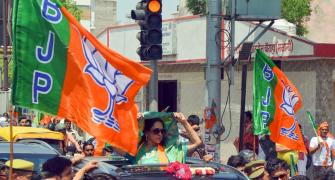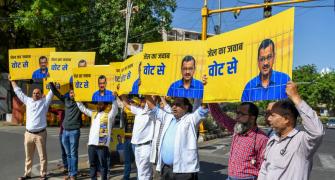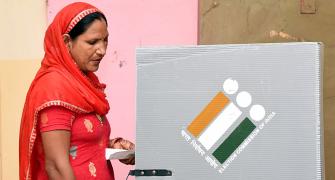The process of issue of smart cards for emigrant workers will be taken up in the next three months, a top government of India official said in Hyderabad on Monday.
Speaking at the session on 'Indians in the Gulf' on the concluding day of the 4th Pravasi Bharatiya Divas 2006, R K Singh, Protector-General of Emigrants in the Ministry of Overseas Indian Affairs, outlined a series of welfare measures being initiated by the government to protect the interests of the emigrant workers, particularly those working in the Gulf region.
He said the Pravasi Bharatiya Bima Yojana 2006 would be introduced from February 1, with better insurance coverage. The Yojana extends the coverage from Rs 200,000 to Rs 500,000, provides for emergency medical treatment up to Rs 50,000 abroad and envisages legal expenses coverage up to Rs 25,000.
The insurance company will cover the repatriation of the worker to India during the entire period of employment.
It was also proposed to set up a Central Manpower Export Promotion Council for assigning current requirements and project future labour needs in foreign destinations. An Overseas Workers Welfare Fund would also be set up, with a one-time lump sum grant by the government or by charging a nominal amount from the emigrants while granting emigration clearance.
Reeling out statistics, he said: "An estimated 5 million Indian emigrants are working abroad, out of whom 4 million are in the Gulf alone." The number of emigration clearances for employment rose from 199,000 in 1999 to 472,000 in 2004. Remittances by Indian migrant workers are highest among migrant communities. Remittances increased from $12 billion in 1999-2000 to $20.5 billion in 2004-05.
Singh said that the government of India mooted starting pre-departure orientation programmes for the overseas workers with the help of state governments. Moreover, non-governmental organisations would be enlisted as information resource centres for providing advice to potential overseas workers.
Referring to the mounting number of cases of exploitation of the emigrant workers in their host countries, particularly by employers, he said provision of legal aid to the overseas workers in cases of labour-related problems was on cards. The government of India will also impose curbs and controls on the deployment of workers abroad on visit visa.
Explaining the rationale for this, the official said the government was aware about large-scale misuse of visit visas. The government was able to achieve some success. While 472,000 emigration clearances were accorded, another 450,000 emigrants went abroad on visit visas in 2004. During 2005, however, 550,000 emigration clearances were issued while 450,000 emigrants went abroad on visit visas.
Singh said the government of India was signing memoranda of understanding with major labour recipient countries for putting in place a joint mechanism for redressal of grievances of workers. MoUs were signed with Qatar and Jordan as far back as in 1986 and 1988 respectively.
"Efforts are on to sign fresh MoUs with Kuwait, Malaysia and Saudi Arabia. Initiatives have been taken to discuss MoUs on manpower with Oman and Maldives," he pointed out.
India has proposed to open 24x7 helplines at 13 Indian missions in these countries. The government would extend full support to the Overseas Workers Resource Centre in the GCC (Gulf Cooperation Council) countries to provide assistance and support services to emigrant workers.
He said the ministry of overseas Indian affairs has taken up identification of the category-wise job opportunities and requirements overseas.
Other measures in this area include creation of infrastructure for providing vocational training and skill upgradation, certification by state institutes for skilled categories, identification of a nodal institute at state level to monitor identified training centres and development of standard module for each discipline.
Only Kerala government has taken up skill upgradation for housemaids, drivers, nurses and other health workers. Other states would have to follow suit, he added.







